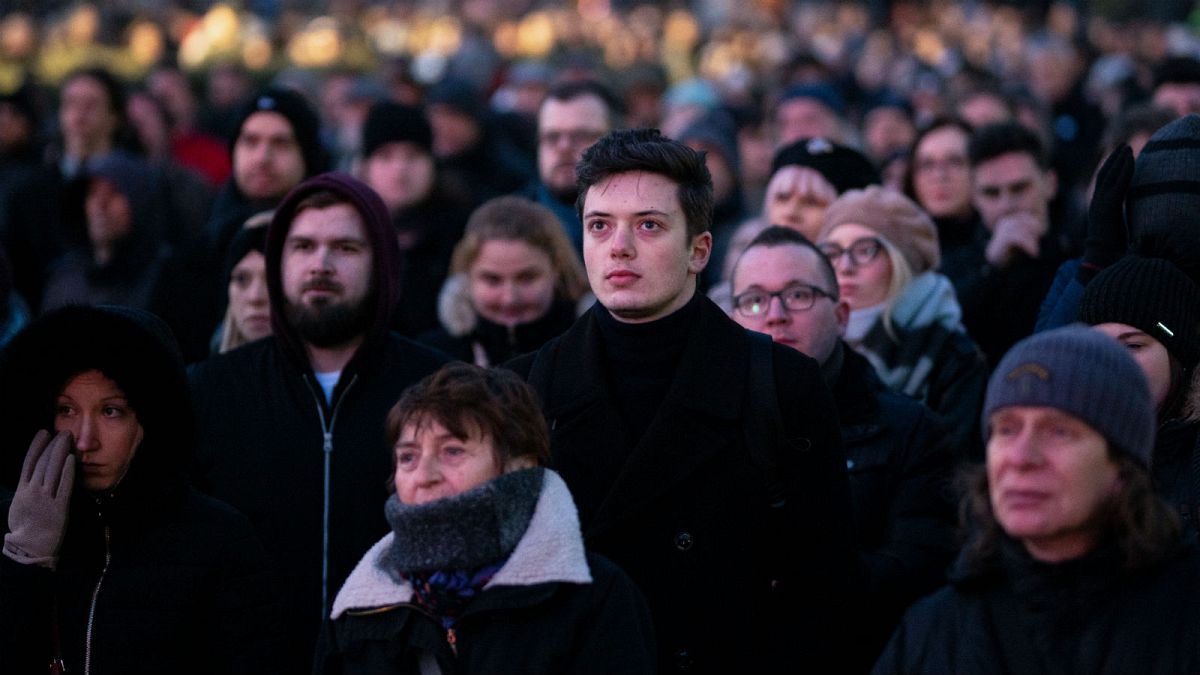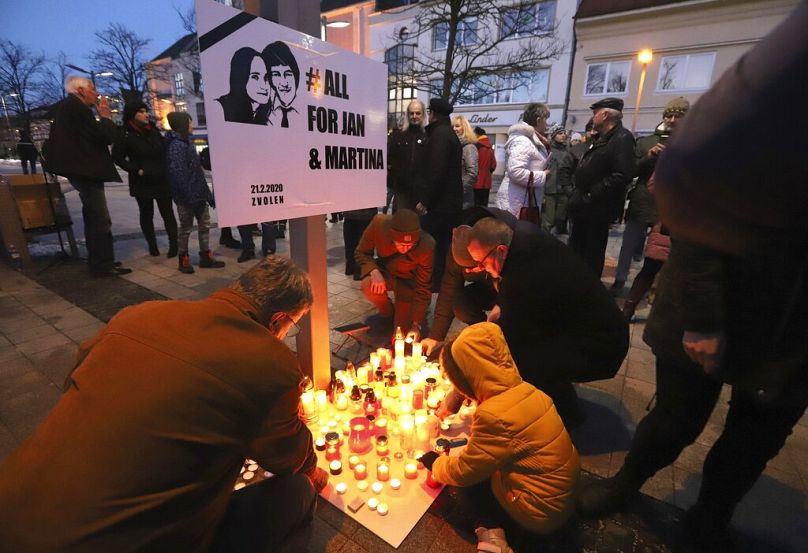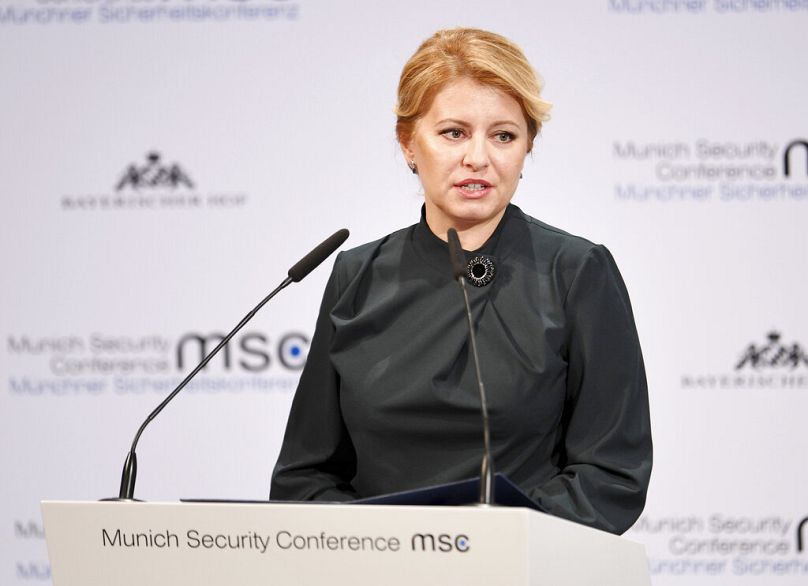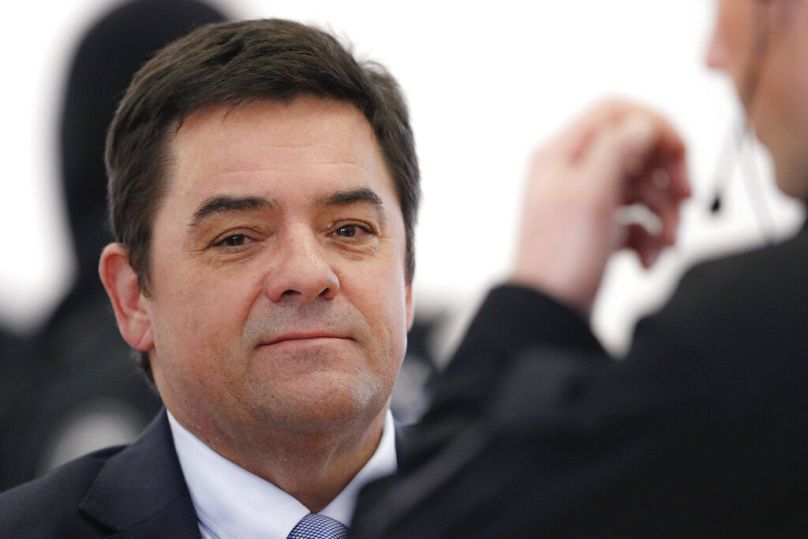All you need to know to understand Slovakia's pivotal parliamentary poll on Saturday.
The murder of journalist Jan Kuciak two years ago and the subsequent mass protests over corruption have caused a political earthquake in Slovakia.
Its prime and interior minister quit before pro-European liberal Zuzana Čaputová swept to power as president.
Now, with a parliamentary poll coming up on Saturday 29 February, will this progressive surge continue?
What’s the background?
Slovakia has been dominated by one party since the mid-2000s: SMER-SD, social democratic left-wing populists.
But since the February 2018 slaying of Kuciak — who had been investigating the misuse of EU funds in Slovakia, tax fraud and alleged ties between government officials and the Italian mafia — the party’s popularity has tumbled.
Kuciak's fiancée, Martina Kušnírová, was also gunned down.
The murders sparked the biggest street protests since the 1989 anti-communist Velvet Revolution in Czechoslovakia as people rallied against persistent allegations of corruption in the country.
“This protest — and I think that they did not get enough publicity outside Slovakia — was a remarkable movement: orderly, calm and very clear,” Erika Harris, a politics professor and Slovakia expert from the University of Liverpool, told Euronews. “Corruption is a huge problem in Slovakia and the majority of people really resent it.”
SMER-SD has gone from picking up a 44% vote share in 2012 to hoping to secure just 17% this time around, according to forecasts.
A host of parties and personalities are jostling to fill the SMER-SD vacuum, making the result fragmented and unpredictable.
Who are the main parties?
SMER-SD Left-wing, social-democratic populists led by ex-PM Robert Fico and despite recent struggles is still predicted to be the largest party following Saturday’s vote.
Freedom and Solidarity (SaS) Tech-savvy liberals who won the second biggest haul of seats in 2016 and advocate the decriminalisation of small amounts of marijuana.
Slovak National Party (SNS) Right-wing nationalists who went into coalition with Smer-SD after it lost its absolute majority at the last election.
Ordinary People (OĽANO–NOVA) Centre-right populists that came third in the 2016 election. On the same ticket as another centre-right party, NOVA.
People’s Party - Our Slovakia (LSNS) Slovakia’s Constitutional Court last year ruled against banning Marian Kotleba’s neo-Nazi party, which is anti-EU, -NATO, -migrant and -LGBT, according to its programme.
Most-Hid Pro-European party — and junior partner in the last coalition — that represents the Hungarian minority and promotes links with the Slovak majority.
We Are Family (Sme Rodina) Relatively young right-wing populists who are anti-immigration and led by Slovak businessman Boris Kollár.
Christian Democratic Movement (KDH) Pro-EU and socially conservative. Wiped out of parliament after the 2016 election.
Progressive Slovakia The socially liberal and pro-EU party of newly elected president Čaputová.
TOGETHER – Civic Democracy A new centre-right party that is standing on the same election ticket as Progressive Slovakia.
For the People (Za ľudí) New pro-EU conservative party founded last year by ex-Slovakia president Andrej Kiska.
What is the likeliest outcome?
Experts say the splintered state of politics in Slovakia means that it is extremely difficult to forecast the result.
SMER-SD, despite its popularity plunge, is still predicted to be the largest party but might struggle to find a coalition partner.
“They are toxic,” agreed Harris. “Because behind the new prime minister (Peter Pellegrini), is always the former one, Robert Fico.”
There is the prospect that one of the only options open to SMER-SD is getting into bed with neo-Nazi outfit People’s Party - Our Slovakia, which opinion polls have predicted will get around 10% of the vote.
“Now, it's been said by everybody that they will know not to go into coalition with this party,” continued Harris.
“But that cannot be guaranteed because this party is supporting SMER-SD in various legislations that are passed in the parliament.”
“Its leader is a very astute politician and he appeals to young people. He appears to be a rebel. He speaks, apparently, the truth. What he means. And also they have not been in power, therefore they cannot be blamed for any corruption scandals. This is a populist party that claims to make order and anti corruption.”
But Milan Nic, an expert on Slovakia from the German Council on Foreign Relations, told Euronews a coalition of President Čaputová’s pro-EU party Progressive Slovakia; Ordinary People; and For the People was among the likeliest options.
Why should the rest of Europe care about this election?
Experts say there is no chance Slovakia will turn away from Brussels in this election, but it might see it edge closer to the likes of Hungary and Poland where rule of law concerns have seen them branded EU troublemakers.
The election could also spell the end of SMER-SD’s period of dominance and make Slovakia a test case of how central European countries cope in such situations.
“These elections are an interesting test as to what happens after the Kaczyńskis [leader of the ruling Law and Justice party in Poland] and Orbans [Hungary’s long-standing prime minister],” said Nic.
“This is the type of situation we have in Slovakia. After Fico. He was slightly more moderate than the other two and definitely not conservative, he was rather a left-wing populist.
“But what happens, structurally, when his era goes away?”
Will Slovakia’s progressive surge continue?
The reaction to Kuciak’s murder and the subsequent anti-corruption protests have been credited with helping Čaputová’s to power.
But experts have cast doubt over whether that momentum can be maintained in the parliamentary election.
“There is a different narrative about these elections than last year and I think they will be a surprise to the expectation of Slovakia as some kind of frontrunner in the backlash against populism,” said Nic.
“There will be a backlash against corruption and populism but this won’t just go to the liberals.”
Harris said Progressive Slovakia, the party of President Čaputová, had helped to earn important victories after Kuciak’s murder but that it had now lost impetus.
“It's lost the momentum now that they managed to see off the prime minister [Fico] and the interior minister, which is quite unbelievable really, because it started off with students,” said Harris.
“This is an electorate which gets enthusiastic and is very quickly disappointed, as well,” she added. “New parties keep coming.”
What impact will Marian Kocner’s conviction have on the election?
Slovak businessman Marian Kocner, who is accused of ordering Kuciak’s murder, was sentenced to 19 years in prison on Thursday — two days before the election — in a separate fraud case.
Kocner and former Slovak economy minister Pavol Rusko were convicted of extracting €69 million in a fraud involving American company CME, the current owner of Slovak television station Markiza.
Kocner has pleaded not guilty in a separate trial in which prosecutors say he ordered the killing of Kuciak and his fiancee.



